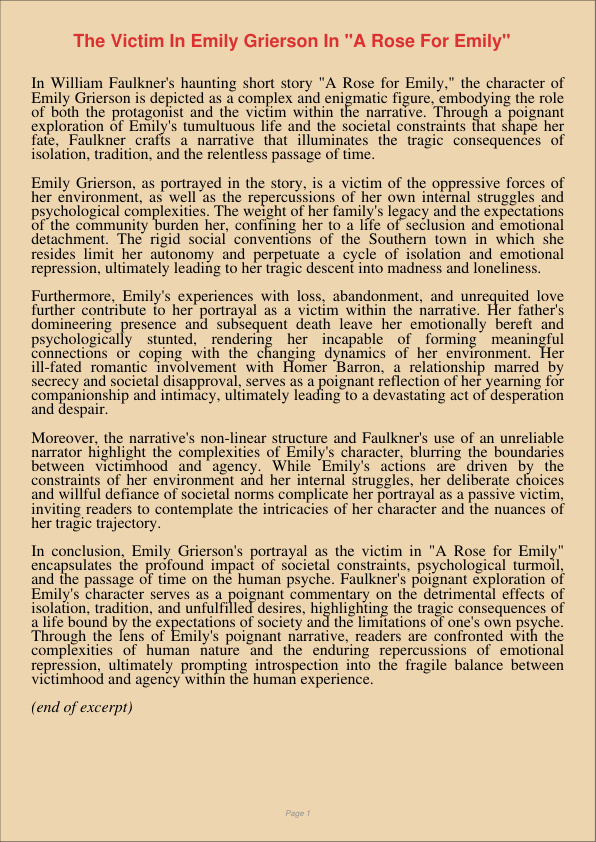
In William Faulkner’s haunting short story “A Rose for Emily,” the character of Emily Grierson is depicted as a complex and enigmatic figure, embodying the role of both the protagonist and the victim within the narrative. Through a poignant exploration of Emily’s tumultuous life and the societal constraints that shape her fate, Faulkner crafts a narrative that illuminates the tragic consequences of isolation, tradition, and the relentless passage of time.
Emily Grierson, as portrayed in the story, is a victim of the oppressive forces of her environment, as well as the repercussions of her own internal struggles and psychological complexities. The weight of her family’s legacy and the expectations of the community burden her, confining her to a life of seclusion and emotional detachment. The rigid social conventions of the Southern town in which she resides limit her autonomy and perpetuate a cycle of isolation and emotional repression, ultimately leading to her tragic descent into madness and loneliness.
Furthermore, Emily’s experiences with loss, abandonment, and unrequited love further contribute to her portrayal as a victim within the narrative. Her father’s domineering presence and subsequent death leave her emotionally bereft and psychologically stunted, rendering her incapable of forming meaningful connections or coping with the changing dynamics of her environment. Her ill-fated romantic involvement with Homer Barron, a relationship marred by secrecy and societal disapproval, serves as a poignant reflection of her yearning for companionship and intimacy, ultimately leading to a devastating act of desperation and despair.
Moreover, the narrative’s non-linear structure and Faulkner’s use of an unreliable narrator highlight the complexities of Emily’s character, blurring the boundaries between victimhood and agency. While Emily’s actions are driven by the constraints of her environment and her internal struggles, her deliberate choices and willful defiance of societal norms complicate her portrayal as a passive victim, inviting readers to contemplate the intricacies of her character and the nuances of her tragic trajectory.
In conclusion, Emily Grierson’s portrayal as the victim in “A Rose for Emily” encapsulates the profound impact of societal constraints, psychological turmoil, and the passage of time on the human psyche. Faulkner’s poignant exploration of Emily’s character serves as a poignant commentary on the detrimental effects of isolation, tradition, and unfulfilled desires, highlighting the tragic consequences of a life bound by the expectations of society and the limitations of one’s own psyche. Through the lens of Emily’s poignant narrative, readers are confronted with the complexities of human nature and the enduring repercussions of emotional repression, ultimately prompting introspection into the fragile balance between victimhood and agency within the human experience.
「真诚赞赏,手留余香」
真诚赞赏,手留余香
使用微信扫描二维码完成支付
